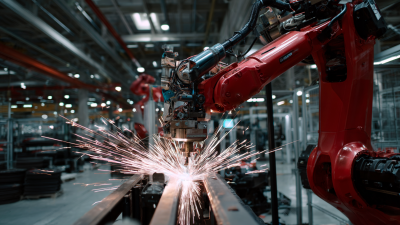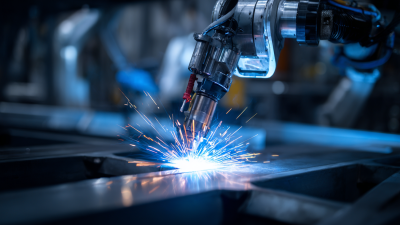Top 5 Benefits of Robotic Process Automation for Modern Businesses
In the rapidly evolving landscape of modern business, companies are increasingly turning to innovative solutions to enhance efficiency and productivity. One of the most notable advancements in this realm is Robotic Process Automation (RPA), a technology that is transforming how organizations operate by automating repetitive tasks. According to John Doe, an expert in robotic process optimization, "Robotic process automation not only streamlines workflows but also empowers employees to focus on more strategic initiatives." This perspective highlights the dual benefit of RPA: improving operational efficiency while allowing talent to engage in higher-value work.

As businesses seek to remain competitive in a fast-paced market, the adoption of robotic processes has become not just an option but a necessity. By leveraging RPA, organizations can reduce errors, increase speed, and ultimately lower operational costs. With leading firms continually sharing success stories of RPA implementation, the demand for understanding its benefits has never been greater. Therefore, exploring the top advantages of robotic process automation will provide crucial insights for businesses looking to harness the power of this transformative technology.
Enhancing Operational Efficiency through Robotic Process Automation
Robotic Process Automation (RPA) is transforming how modern businesses operate by significantly enhancing operational efficiency. By automating repetitive and time-consuming tasks, RPA allows employees to focus on more strategic activities that require human insight and creativity. This shift not only boosts productivity but also minimizes the risk of errors often associated with manual processes. As a result, organizations can achieve faster turnaround times and increased accuracy, leading to improved service delivery.
Moreover, RPA facilitates seamless integration with existing systems, enabling organizations to optimize their workflows without overhauling their entire infrastructure. This adaptability ensures that businesses can react quickly to changing market demands and customer needs. By leveraging RPA, companies can streamline their operations, reduce costs, and allocate resources more effectively. The impact of enhanced operational efficiency through RPA is profound, empowering businesses to remain competitive in today's fast-paced environment.

Cost Reduction Strategies Enabled by Robotic Process Automation
Robotic Process Automation (RPA) offers significant cost reduction strategies for modern businesses by streamlining processes and minimizing manual errors. By automating repetitive tasks such as data entry, invoice processing, and customer service inquiries, companies can reduce labor costs and improve operational efficiency. This not only allows employees to focus on higher-value tasks but also accelerates overall workflow, leading to faster service delivery and increased customer satisfaction.
Tips: To maximize cost savings with RPA, start by identifying the most time-consuming and error-prone tasks within your organization. Prioritize these areas for automation and measure the impact on productivity and cost after implementation. Additionally, invest in training your team to manage and optimize RPA tools, ensuring that they can leverage the technology to its full potential.
Another effective strategy is combining RPA with other technologies, such as artificial intelligence (AI) and machine learning (ML). This hybrid approach can further enhance automation capabilities, enabling businesses to unlock new efficiencies and cost savings. Implementing RPA in such a synergistic manner allows for sophisticated decision-making processes and provides a competitive edge in today's fast-paced market.
Tips: Regularly review and refine your automation processes to identify new opportunities for cost savings. Staying updated with advancements in RPA technology can help your business remain agile and prepared for future challenges, further enhancing your cost reduction strategies.
Boosting Accuracy and Minimizing Errors with Automation Technology
Robotic Process Automation (RPA) technology significantly enhances accuracy and reduces errors across various business operations. By automating repetitive tasks, organizations can minimize the risk of human error that often arises from manual data entry or complex process execution. RPA systems follow predefined rules precisely, ensuring that the same steps are executed consistently without the discrepancies that can occur when human agents are involved. This meticulous adherence to protocols not only elevates the quality of outputs but also enhances compliance with industry regulations.
Moreover, integrating RPA into business workflows facilitates faster processing times, enabling companies to handle higher volumes of transactions with enhanced reliability. This increased efficiency leads to clearer data insights, as errors that could obscure analytical reports are largely eliminated. Consequently, businesses are not only able to trust their data but also to leverage it more effectively for strategic decision-making and operational improvement, positioning them for greater competitive advantage in today's fast-paced market.
Top 5 Benefits of Robotic Process Automation for Modern Businesses
Transforming Employee Roles and Fostering Innovation in the Workplace
Robotic Process Automation (RPA) is redefining the roles of employees in modern businesses by automating repetitive tasks and allowing personnel to focus on higher-value activities. According to a report by McKinsey, up to 45% of work activities could be automated, which underscores the potential for RPA to free employees from mundane duties. This shift not only enhances job satisfaction but also promotes a culture of innovation, as employees can devote their time to strategic initiatives that drive growth and efficiency.

By integrating RPA into their operations, companies are fostering a dynamic workplace environment where collaboration and creativity thrive. A study by Deloitte indicates that organizations implementing RPA have seen a 20-40% increase in productivity. This improved efficiency encourages teams to leverage their unique skills to solve complex problems rather than getting bogged down by routine tasks. Ultimately, RPA is not just a tool for process improvement; it is a catalyst for transforming employee roles and reshaping workplace dynamics, paving the way for enhanced innovation and adaptability in a rapidly evolving business landscape.
Improving Customer Experience and Satisfaction with Automated Processes
Robotic Process Automation (RPA) is revolutionizing the way modern businesses enhance their customer experience and satisfaction. According to a report by McKinsey, organizations that implement RPA can reduce customer service response times by up to 60%. This speed not only meets customer demands for quick resolutions but also fosters greater trust in the brand. RPA handles repetitive tasks, enabling customer service representatives to focus on complex inquiries that require emotional intelligence and critical thinking, thus providing a more personalized service that today's consumers expect.
The impact of RPA on customer satisfaction is significant. According to a study by Gartner, businesses that successfully integrate RPA into their operations report an increase in customer satisfaction scores by up to 30%. Automation reduces errors in data handling, ensuring customers receive accurate information promptly. Moreover, with 68% of consumers stating that they are willing to pay more for better customer service (Zendesk), the financial implications of improved customer interactions through automated processes are profound. By enhancing efficiency and accuracy, RPA tools empower companies to maintain high levels of service that not only attract new customers but also retain existing ones.
Top 5 Benefits of Robotic Process Automation for Modern Businesses - Improving Customer Experience and Satisfaction with Automated Processes
| Benefit | Description | Impact on Customer Experience | Estimated ROI (%) |
|---|---|---|---|
| Increased Efficiency | Automation of repetitive tasks allows employees to focus on higher-value work. | Faster response times and improved service delivery. | 20% |
| Cost Reduction | Automation reduces the cost of manual processes and minimizes errors. | Lower operational costs can lead to better pricing for customers. | 30% |
| Enhanced Accuracy | Robotic processes reduce human error in data entry and processing. | More accurate data leads to improved decision-making and service quality. | 25% |
| Improved Compliance | RPA ensures processes are performed according to regulatory standards. | Greater trust in business practices enhances customer loyalty. | 15% |
| Better Analytics | Automation collects data that can be analyzed for business insights. | Data-driven insights improve service and product offerings. | 35% |
Related Posts
-

Unlocking the Future of Automation with Digital Robotic Process Techniques
-

Exploring the Future of Robotic Process Automation for Business Efficiency
-

Robotic Process Innovations at the 138th Canton Fair 2025 Transforming Industry Standards in China
-

Exploring the Future of Manufacturing: How Welding Robots Revolutionize the Industry
-

Exploring the Future of Robotic Laser Welding in Advanced Manufacturing Techniques
-

Why Robot Software is Essential for Modern Business Efficiency






